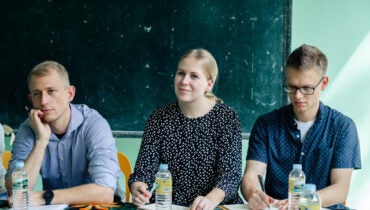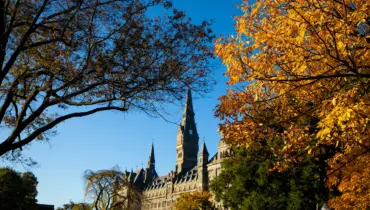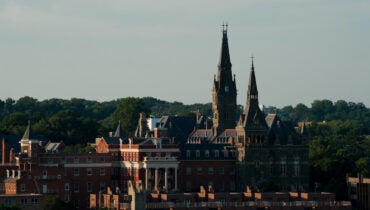Before former Secretary of State Hillary Rodham Clinton delivered a recent keynote address at Georgetown University, a student assistant from the Georgetown Institute for Women, Peace and Security (GIWPS) had the opportunity to introduce her to the 700-person crowd.
“The chance to meet Hillary Clinton as a junior in college is definitely something that will keep on inspiring and motivating me,” reflects Abbey Nichols (SFS ‘20).
Learn how Abbey Nichols and Meredith Forsyth (SFS ‘19) first became interested in global women’s issues, began working at GIWPS, and ultimately met Secretary Clinton, who serves as the honorary founding chair of GIWPS.
Meeting Secretary Hillary Clinton
In February 2019, Georgetown hosted a day-long symposium on the “Future of Diplomacy.”
Abbey Nichols was selected by event organizers to introduce Secretary Clinton’s keynote address at the symposium.
“I met [Clinton] backstage at Gaston Hall before her keynote speech. It was me and some other students, and she shook each of our hands and spent a couple minutes talking with each person,” says Nichols.
“It was up to you to say something memorable. When she got to me, I said…I work for Melanne Verveer, I work at your institute, I love the work you do!”
Earlier that day, Meredith Forsyth introduced a panel discussion on “Values in U.S. Foreign Policy” – during which Secretary Clinton was sitting in the front row.
Towards the end of her introductory remarks, Forsyth looked at Clinton and said:
“Secretary Clinton, I never imagined that I would one day stand here and address you, representing an Institute that you founded, and with conviction that I will dedicate my life to these issues [of women’s rights and gender equality], as you have done yours. You have inspired me and countless others.”
A Passion for Women’s Issues
Forsyth has a long standing interest in gender equality and came to the School of Foreign Service at Georgetown with the intention of studying international affairs and foreign policy from the perspective of human rights, specifically women’s and girls’ rights.
“I started to realize that the issues that girls face don’t exist in a vacuum, there’s all this political context and dynamics at play that an education at Georgetown can give you some insight into,” explains Forsyth.
Her freshmen proseminar on women and politics in Africa with Professor Lahra Smith sparked an interest in African Studies and inspired her to join a trip to Rwanda to see firsthand how women have led political and peacebuilding initiatives since the conflict.
“It got me more and more interested in these issues of women in peace and security,” says Forsyth.
Nichols’ interest in gender issues is more recent, sparked by domestic politics and the 2016 election.
She began to intern for her senator and now presidential candidate, Amy Klobuchar, and assumed a leadership role with a student podcast at the Georgetown Institute for Politics and Public Service.
“As I was becoming more involved in politics, I began really understanding the extent of the inequality between men and women and thinking, that’s completely unfair and unacceptable. I wanted to learn more about women’s equality and I found GIWPS and thought it was a perfect place to start,” says Nichols.
Working for the Georgetown Institute for Women, Peace and Security
Nichols has worked at GIWPS for two years and says it has grown her passion not just for promoting women’s role in international politics, but also for growing women’s participation in conflict mitigation and international diplomacy.
“It makes me want to use this knowledge to drive my career after graduation and stay involved in this field,” she adds.
For Forsyth, working at GIWPS has made her aware of how little a gender perspective is incorporated in the classroom.
“A lot of times the way we look at issues does not include the full picture. In one of my classes we were looking at deradicalization programs from a traditional lens, and at the same time I was working on a report with GIWPS about including women in deradicalization efforts. I saw how including that perspective shifted how we implement solutions,” says Forthsyth.
She adds that her time at GIWPS has influenced her professional interests:
“I want to pursue the same kind of issues I’ve always been passionate about but with a more nuanced and thoughtful view toward how to actually operationalize solutions to these kind of problems.”


